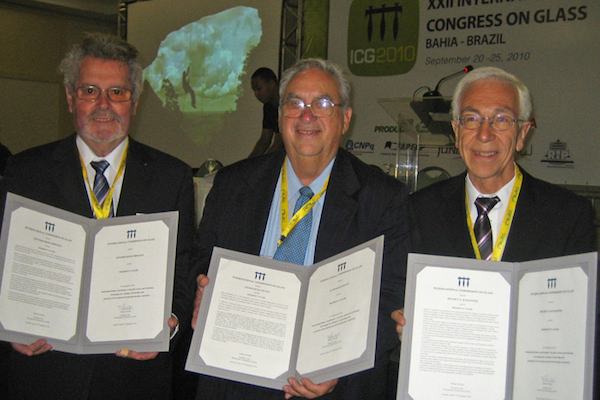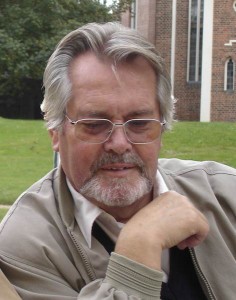
[Image above] (Left to right) Günther Frischat, L. David Pye, and Helmut A. Schaeffer at ICG 2010. Credit: TU Clausthal
[ACerS offers sincere condolences to the family and friends of Günther Frischat, a luminary glass scientist who we recently learned passed away earlier this summer. This celebration of his life come to us from Helmut A. Schaeffer, retired executive director of DGG, and L. David Pye, dean emeritus of Alfred University.]
by Helmut A. Schaeffer and L. David Pye
It was with considerable sadness that we learned on June 2 the passing of a close personal friend and one of the foremost glass scientists of our times—Günther H. Frischat of Clausthal, Germany (July 18, 1937–June 2, 2015).
Frischat received his Ph.D. in physics from the University of Würzburg and was affiliated with the former Max Planck Institute for Silicate Research. His many contributions to advancing our understanding of glass science and engineering are known worldwide—they were so admired by colleagues in Europe that Frischat was nominated for the Nobel Prize in Chemistry in 1995.
The metrics of Frischat’s scientific work are extraordinary. Under his guidance, 102 diploma and 98 doctoral theses were completed while serving as professor and dean of the Faculty of Metallurgy & Materials Science at Clausthal Technical University.
The author and co-author of 345 publications and four books, Frischat still found time to organize several prestigious international conferences. Among these were the Physics of Non-Crystalline Solids; University Conferences Series on Glass Science; and Symposium on Halide Glasses.
For many years he served as regional editor of the Journal of Non-Crystalline Solids and member on the Council of the European Society of Glass Science and Technology. Within the German Society of Glass Technology (DGG), he was a longstanding member of the board of trustees and editorial board of the “Glastechnische Berichte.” He also served as chairman of the renowned technical committee “Physics & Chemistry of Glasses.”
His achievements were further recognized through receipt of the Adolf Dietzel Industry Award; Team Achievement Award of the European Space Agency; Otto Schott Medal of DGG; and President’s Award of the International Commission on Glass. He was a Fellow of the American Ceramic Society, a Fellow of the English Society of Glass Technology, and an Honorary Member of DGG.
The glass community in general—and his many students in particular—will remember his talents as an inspiring university educator, a highly successful glass researcher, and an advocate of international friendship and cooperation. Most important of all, we will miss the open-mindedness, gentleness, charming personality, and enduring friendship he shared so willingly with so many.
We bid him farewell with a heavy heart, but are exceptionally grateful that he once passed our way.

